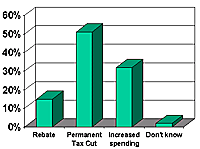Poll: Rebate Takes Back Seat to Permanent Tax Cuts, More Spending
by Tim Pugmire
March 7, 2000
Part of MPR's Session 2000
Results of a new Minnesota Public Radio - Saint Paul Pioneer Press poll show strong support for using the state budget surplus to make permanent tax cuts. But many respondents also want the Legislature to use the excess cash for schools, roads and other projects. The House, Senate and governor have significantly different plans for the projected $1.8 billion surplus, and the poll numbers will likely do little to settle the debate.
POLLSTERS ASKED A SAMPLING
of Minnesota residents to pick their top priority for
the budget surplus from three choices. Fifty-one percent said the money should
go for permanent tax cuts that would remain in effect. Thirty-two percent
favored spending the money on special projects, such as education,
transportation and law enforcement. Just 15 percent favored a one-time tax
rebate, like the one dispersed last year.
Governor Ventura is proposing a $470 million dollar sales-tax rebate, a cut in license-tab fees, and more spending on transportation and transit. He favors holding onto the bulk of surplus for a major property tax overhaul next year.
But the Republican majority in the House wants to return most the surplus to taxpayers, with some new spending on highways, law enforcement and education. House Speaker Steve Sviggum says the priority is providing tax relief. "The results of the poll speaks very strongly to our House Republican plan," Sviggum said. "It's permanent tax cuts, permanently reducing that tax burden upon moms and dads in the state, is where most voters and most citizens of the state would like to see the priority brought forward.
The DFL-controlled Senate is also looking a balance of tax breaks and strategic spending, and Senate leaders say the poll results bolster their approach.
Senator Ember Reichgott Junge says she's not surprised so few Minnesotans are asking for another rebate check. She says she's heard the same message from her constituents. "People say, 'Look, keep the money, it's just a couple hundred dollars. Put it into education. Put it into roads or transportation or transit. Put it into public safety like the Katie Poirier bills.'"
If there are new spending initiatives this year, education might be the easiest sell among voters. Poll respondents ranked education as the most important issue facing Minnesota, followed by taxes and health care.
Minnesotans also appear generally confident in their elected representatives, but remain divided on whether the legislature should go from two houses to one. A majority of those polled rated the performance of the state Legislature as good or excellent.
On the unicameral question, 42 percent oppose such a move, while 35 percent favor the reorganization. But 23 percent remain undecided. The poll did not ask whether the issue should be put to voters on a statewide ballot.
by Tim Pugmire
March 7, 2000
Part of MPR's Session 2000
|
|
RealAudio 3.0 | See complete poll |
Results of a new Minnesota Public Radio - Saint Paul Pioneer Press poll show strong support for using the state budget surplus to make permanent tax cuts. But many respondents also want the Legislature to use the excess cash for schools, roads and other projects. The House, Senate and governor have significantly different plans for the projected $1.8 billion surplus, and the poll numbers will likely do little to settle the debate.
POLLSTERS ASKED A SAMPLING
| |
|
|
|
||
Governor Ventura is proposing a $470 million dollar sales-tax rebate, a cut in license-tab fees, and more spending on transportation and transit. He favors holding onto the bulk of surplus for a major property tax overhaul next year.
But the Republican majority in the House wants to return most the surplus to taxpayers, with some new spending on highways, law enforcement and education. House Speaker Steve Sviggum says the priority is providing tax relief. "The results of the poll speaks very strongly to our House Republican plan," Sviggum said. "It's permanent tax cuts, permanently reducing that tax burden upon moms and dads in the state, is where most voters and most citizens of the state would like to see the priority brought forward.
The DFL-controlled Senate is also looking a balance of tax breaks and strategic spending, and Senate leaders say the poll results bolster their approach.
Senator Ember Reichgott Junge says she's not surprised so few Minnesotans are asking for another rebate check. She says she's heard the same message from her constituents. "People say, 'Look, keep the money, it's just a couple hundred dollars. Put it into education. Put it into roads or transportation or transit. Put it into public safety like the Katie Poirier bills.'"
If there are new spending initiatives this year, education might be the easiest sell among voters. Poll respondents ranked education as the most important issue facing Minnesota, followed by taxes and health care.
Minnesotans also appear generally confident in their elected representatives, but remain divided on whether the legislature should go from two houses to one. A majority of those polled rated the performance of the state Legislature as good or excellent.
On the unicameral question, 42 percent oppose such a move, while 35 percent favor the reorganization. But 23 percent remain undecided. The poll did not ask whether the issue should be put to voters on a statewide ballot.

